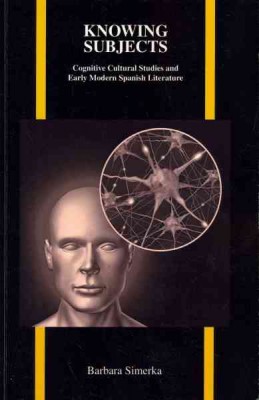| Knowing Subjects: Cognitive Cultural Studies and Early Modern Spanish Contributor(s): Simerka, Barbara (Author) |
|
 |
ISBN: 1557536449 ISBN-13: 9781557536440 Publisher: Purdue University Press OUR PRICE: $44.55 Product Type: Paperback - Other Formats Published: April 2013 |
| Additional Information |
| BISAC Categories: - Literary Criticism | European - Spanish & Portuguese - Literary Criticism | Women Authors - Literary Criticism | Semiotics & Theory |
| Dewey: 860.9 |
| LCCN: 2012039055 |
| Series: Purdue Studies in Romance Literatures |
| Physical Information: 0.67" H x 6.06" W x 9.07" (0.94 lbs) 259 pages |
| Themes: - Sex & Gender - Feminine |
| Descriptions, Reviews, Etc. |
| Publisher Description: In Knowing Subjects, Barbara Simerka uses an emergent field of literary study" cognitive cultural studies"to delineate new ways of looking at early modern Spanish literature and to analyze cognition and social identity in Spain at the time. Simerka analyzes works by Cervantes and Grac -an, as well as picaresque novels and comedias. Employing an interdisciplinary approach, she brings together several strands of cognitive theory and details the synergies among neurological, anthropological, and psychological discoveries that provide new insights into human cognition.Her analysis draws on Theory of Mind, the cognitive activity that enables humans to predict what others will do, feel, think, and believe. Theory of Mind looks at how primates, including humans, conceptualize the thoughts and rationales behind other people's actions and use those insights to negotiate social relationships. This capacity is a necessary precursor to a wide variety of human interactions"both positive and negative"from projecting and empathizing to lying and cheating.Simerka applies this theory to texts involving courtship or social advancement, activities in which deception is most prevalent"and productive. In the process, she uncovers new insights into the comedia (especially the courtship drama) and several other genres of literature (including the honor narrative, the picaresque novel, and the courtesy manual). She studies the construction of gendered identity and patriarchal norms of cognition"contrasting the perspectives of canonical male writers with those of recently recovered female authors such as Mar -a de Zayas and Ana Caro. She examines the construction of social class, intellect, and honesty, and in a chapter on Don Quixote, cultural norms for leisure reading at the time. She shows how early modern Spanish literary forms reveal the relationship between an urbanizing culture, unstable subject positions and hierarchies, and social anxieties about cognition and cultural transformation. |